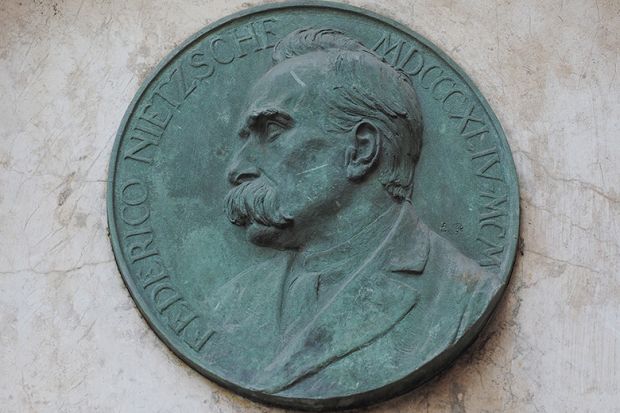What would Friedrich Nietzsche make of Donald Trump? Of the European Union? Of the UK voting for Brexit?
These might seem like silly questions, yet Nietzsche has often been called on in support of political causes, most infamously with the issuing of copies of Thus Spoke Zarathustra to German soldiers during the Great War. One of the appreciative recipients was Adolf Hitler.
Indeed, in this unusual study of a much-quoted but little understood philosopher, Gary Shapiro argues that wars of civilisations, jihadism and, yes, Brexit, have all been to some extent foreseen and foreshadowed by Nietzsche.
Take the EU, for example. Nietzsche is presented here as firmly endorsing it as a grand project “allowing for hybridity, nomadism and cosmopolitanism”, as a route for “becoming one”. And, of course, for undermining the nation state, that false god of Hegel’s.
However, Nietzsche’s identification of the weakening of nation states and mongrelisation of peoples has long been tied to completely different political bandwagons. But Shapiro is not interested in this point, saying that too much time has been spent “attacking or praising Nietzsche’s political thought” for its supposed sympathies – just before launching into a long paean to his political wisdom. As Zarathustra speaks of a shrinking Earth and its last inhabitants, Shapiro hears a critique of globalisation and mass consumption, of modern states in the grip of “money-makers and military despots”.
Although there are many flashes of insight, this book’s style is dense, repetitive and pedantic. Hobby horses, such as the distinction between the words “world” and “earth”, are laboriously paraded. Nietzsche is presented as “one of the very few major philosophers to have taken on questions of global scope”, which seems a ridiculous claim. That Shapiro supposes that prior to Alexander there was little exchange between East and West surely reflects a casually Eurocentric bias.
He’s too quick, too, to dismiss the work of other researchers; those who say, for example, that Nietzsche was at various points either sick or unhinged. Instead he interprets each and all of his “hyperbolic expressions” as subtle allegories. It’s rather a fine line to draw. And if Shapiro says that there are knots that are better left untied in Nietzsche’s writing, he frequently claims to have expertly tied up this or that stray end.
Nietzsche is interested in geography, we are told, not history, and certainly not the kind of history of nation states exulted by his illustrious and despised predecessor Hegel. Nietzsche, Shapiro explains earnestly, “out-Hegels Hegel”, deconstructing his logic in a way that is “ultimately geophilosophical rather than world-historical”. Quite what geophilosophy is when it is at home is never made clear, but it seems to fit with Shapiro’s preference for understanding the philosopher as a kind of social geographer. This is made explicit in the critique of Hegel’s human history for elevating to supremacy events that are, in geological time, no more than the blink of an eye.
Philosophers, wrote Nietzsche, fall into two sorts: those who think for themselves, and those who think for others. Alas for Nietzsche, despite being intent to do the former, he ended up doing the latter.
Martin Cohen is editor of The Philosopher and author, most recently, of Cracking Philosophy (2016).
Nietzsche’s Earth: Great Events, Great Politics
By Gary Shapiro
University of Chicago Press, 264pp, £31.50
ISBN 9780226394459 and 4596 (e-book)
Published 14 November 2016
POSTSCRIPT:
Print headline: Beyond history and philosophy
Register to continue
Why register?
- Registration is free and only takes a moment
- Once registered, you can read 3 articles a month
- Sign up for our newsletter
Subscribe
Or subscribe for unlimited access to:
- Unlimited access to news, views, insights & reviews
- Digital editions
- Digital access to THE’s university and college rankings analysis
Already registered or a current subscriber? Login




